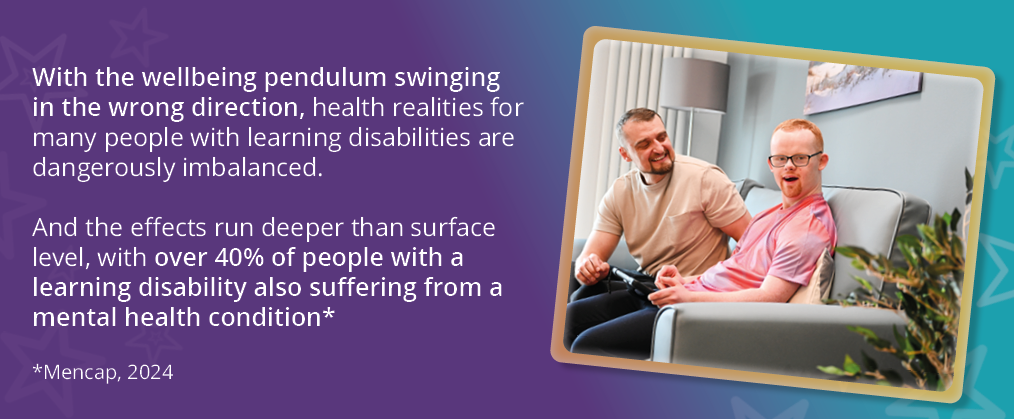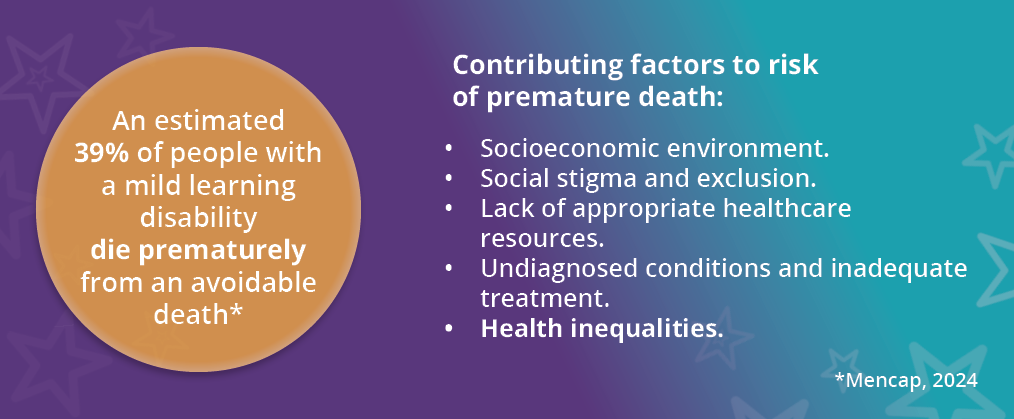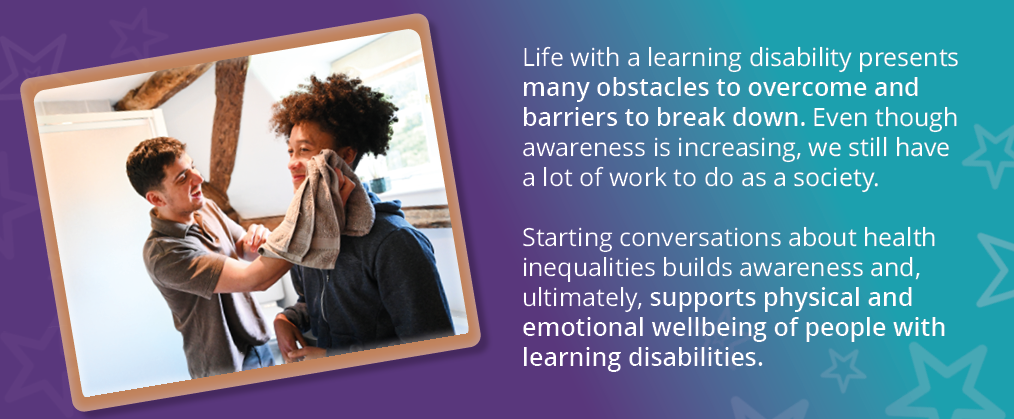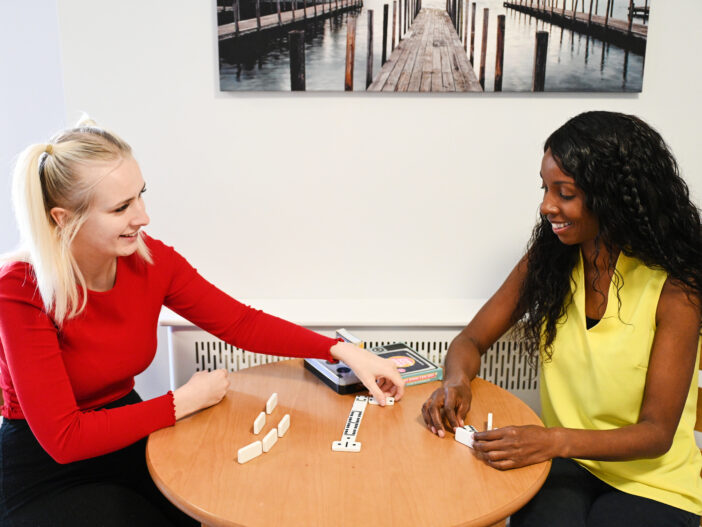Beyond the surface: how health inequalities affect mental health in people with learning disabilities
Health is wealth and, for many of us, eating well, keeping active, and attending routine check-ups are part of our daily routines.
But with waiting times for essential appointments and life-saving screenings at an all-time high, many of us feel frustrated that we can’t access the healthcare we need to stay in tip-top shape. Fearing the future of our wellbeing, our health realities hang in tentative balance with a system battling to keep up.
And with the wellbeing pendulum swinging in the wrong direction, health realities for many people, especially those with learning disabilities, are dangerously imbalanced.
Hanging in the balance
Across the UK, public health services are feeling the pinch. Lower rates of trained clinicians and specialists, as well as lengthy waiting lists, build unbeatable barriers for many population groups – including those with learning disabilities.
A lack of clinical support and limited resources means individuals with learning disabilities often aren’t aware of the healthcare they’re entitled to and miss out on essential medical services – including cancer screenings.

Among a community of 1.5 million people with learning disabilities in the UK*, physical health is distinctly poorer than in those without a learning disability. Many factors contribute to this.
Lifelong biological conditions like Down’s syndrome can impact physical health, but social stigma and lack of understanding can also enhance the risk of poor health outcomes for people with learning disabilities.
And the effects run deeper than surface level, with over 40% of people with a learning disability suffering from a mental health condition* – often undiagnosed or misattributed to learning disability behaviours.
Close links between social stigma, poor physical health, and declining mental health means a high number of people with learning disabilities are unfairly impacted by avoidable, and potentially harmful, health inequalities.
Form and function
Learning disabilities are unique to everyone. Causes and symptom presentations vary between individuals. Commonly grouped as mild, moderate, or severe, learning disabilities are lifelong conditions requiring additional support in many areas of daily life.
Although a learning disability is not a physical disability, some conditions may result in physical complications and mobility needs. Several conditions and neurological disorders, including Down’s syndrome, autism, and cerebral palsy often correspond with a degree of learning disability.
For those born with these serious conditions, their scale of disability is usually identified before birth, allowing crucial time for appropriate healthcare and support to be organised for them – and their families.
With less specific conditions, disabilities might not be tangible until early childhood – especially in less severe disabilities.
While severe learning disabilities usually present soon after birth, moderate or mild learning disabilities aren’t usually identified until specific developmental milestones are missed.
And with increased awareness of learning disabilities in our society, a higher number of people are receiving delayed diagnoses later in life – even as late as retirement age.
For others, their learning disability might never be diagnosed.
Missed diagnoses often occur because of socioeconomic disadvantages, with deprived areas being the most affected. Lack of financial resources manifest as under resourced healthcare facilities and a lack of general awareness of learning disabilities. This results in people not receiving the support they need and falling into health inequalities.
Health is wealth
Health inequality refers to differences in health statuses and the distribution of health resources across different population groups.
People with learning disabilities often fall into the pool of health inequalities for many reasons, but emerging research and insights from those on the frontline, including our expertly trained support teams, suggest several key reasons for this:
- Lack of healthcare resources determined by socioeconomic disadvantages.
- Poor awareness of learning disabilities from clinicians providing treatment.
- Communication barriers and lack of suitable communication techniques
- Social exclusion, discrimination, and stigma affecting the quality of care received.
- Restricted involvement from carers and support workers.
People with learning disabilities face serious risks because of health inequalities; including delayed diagnoses and treatment, increased prevalence of chronic conditions like diabetes, epilepsy, and obesity; greater incidences of mental health problems, and increased risk of dying younger than peers in other population groups.
Currently in the UK, an estimated 39% of people with a mild learning disability die prematurely from an ‘avoidable’ death, 32% of those with moderate disabilities are marked with the same fate, as are 26% of people with severe learning disabilities. *
Increased awareness amongst clinicians, joined up working within the social care sector and more adequate healthcare resources are paramount for people with learning disabilities living longer, healthier lives.
Knowledge is power
Because we know how important health and wellbeing is for people with learning disabilities, we educate our teams, so they can help the people we support understand and manage their health and wellbeing.

Our support teams receive regular training on health issues specific to people with learning disabilities – like epilepsy and diabetes. We also provide free access to health-related information and resources tailored to the needs of those with learning disabilities.
In our vibrant services, we encourage the people we support to participate in things they enjoy and maintain an active lifestyle. Our teams work hard to ensure every person we support has access to opportunities that promote healthy living.
We empower the people we support to make healthy choices and communicate the benefits of a healthy lifestyle using a range of communication techniques suited to their needs, like ‘social stories’ and Makaton.
By using person-centred support, our teams dedicate time to getting to know each person we support as an individual. In doing this, they learn to understand each person’s needs and preferences, and become familiar with what is typical behaviour for each person. This enables them to spot when something might not be quite right and act quickly, so the people we support access appropriate healthcare.
And out in the community, our support teams maintain good relationships with local healthcare teams, allowing the people we support to easily access essential screening services and routine appointments, empowering them to lead healthy, happy lives.
Beyond the surface
Mental health can affect anyone, at any time. But learning disabilities are lifelong conditions that people are born with.
Throughout the course of life, someone with a learning disability will have many obstacles to overcome and barriers to face every day. Even though awareness of learning disabilities and inclusion are now more commonly discussed, we still have a long way to go.
As health inequalities remain a significant issue for people with learning disabilities, so does the ongoing battle against mental health inequalities.
Mental health conditions and learning disabilities are often confused because both can affect how someone behaves and communicates. Research suggests that up to 41% of working age adults with a learning disability* experience a mental health problem. Often, they are left to suffer in silence as emotional wellbeing is overlooked or underestimated.
Overall, people with learning disabilities tend to have higher levels of emotional concerns, such as loneliness, depression, anxiety, and low self-esteem, than people who don’t have a learning disability.
There are many reasons fuelling this increased risk, including:
- Socioeconomic environment – poverty and social deprivation may influence mental health problems.
- Trauma – negative experiences early in life and other adverse life events.
- Accessibility – fewer mental health resources and self-help skills available.
- Negative attitudes of other people – social discrimination, stigma, and exclusion.
Health inequalities may also influence mental health conditions in people with learning disabilities. Stemming from social and environmental disadvantages, lack of mental health resources mean people might be misdiagnosed and inadequately treated.
Instead of being supported to weather the waters of their emotional wellbeing, they experience exacerbated, ongoing stress as they try to navigate new feelings and behaviours alone.
Experiencing poorer healthcare in general may also inflame mental health problems in people with learning disabilities, as they bravely try to cope with untreated pain, mobility restrictions, and other physical symptoms, resulting in them suffering in their own skin and preventing them from doing the things that bring them joy.

Mental health problems can change how people with learning disabilities behave. For many, added stress and anxiety around expressing their feelings can exacerbate this even more.
Without a correct diagnosis and appropriate support, the root cause of emotional disturbances can’t be understood, and quality of life can rapidly decline.
Crippling anxiety may heighten challenging behaviours, causing individuals to withdraw from social situations. In turn, increased isolation might further exacerbate mental health problems, deepening feelings of loneliness and depression.
Encouraging expression
At Voyage Care, we use evidenced-based communication techniques, empowering individuals to express their thoughts and feelings in a way that’s comfortable for them. Our compassionate teams actively encourage expression but equally respect individual choices and privacy.
We ensure our support teams understand the importance of mental health by equipping them with skills to identify and respond to mental health issues. Our frequent expert-guided workshops focus on mental health problems common in people with learning disabilities, and establishing support networks where staff can share anecdotal experiences and best practices.
By sharing knowledge, we can increase awareness, draw on the power of education, and support our teams to develop both a best practice framework and a deeper understanding of how the people we support with learning disabilities experience mental health.
Advocating for change
Actively working to raise awareness about health inequalities, we frequently run campaigns highlighting the health disparities faced by people with learning disabilities. Collaborating with external healthcare providers and organisations, we act as advocates for the people we support with learning disabilities. By acting as their voice, we air their concerns, needs, and desires with an aim to improve health services and promote inclusive practices.
Behind the scenes, our expert quality assurance teams conduct and support research into health inequalities and use our findings to nurture our own policies and practices. We also work diligently to ensure health-related policies are developed to reduce imbalances in health outcomes for people with a learning disability – tipping the scales and pulling the wellbeing pendulum back in the right direction.
Even though we know there’s no fast-sticking plaster to solve the health inequality problem, we will continue to raise awareness and smash down health barriers, so people with learning disabilities are empowered to live active, vital, and fulfilled lives.
Find out more
To learn more about our learning disability support and how we can support you, a loved one or a client, visit our learning disabilities page, or fill out our quick enquiry form.

 Information
Information 

